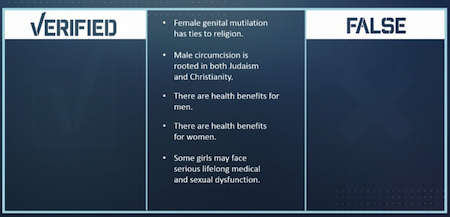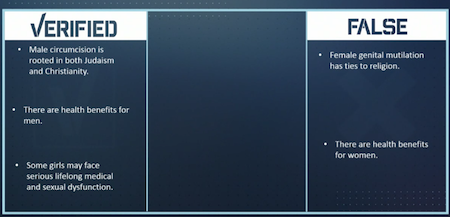When I listen to podcasts discussing circumcision, I’m prepared to sigh and grumble in frustration. Listening to The Dinner Table podcast: Circumcision involved a different experience. I talked pointedly at my radio as I listened, pausing every 30-45 seconds to digest my irritation. It was generally an unpleasant experience because the discussion needed much more reflection and thought in place of the talking-point regurgitation. However, I’m glad I stuck with the episode. It contains numerous succinct examples of both exactly why we shouldn’t circumcise children and how people encounter truth but manage to pick themselves up and scurry off before having to confront reality.
Note: I’ve kept the conversational tics in the transcript from the hosts, Tessa Osborne and Griffin Wiles. (I will do this for their interview with Dr. Joel Greenberg, which I’ll review in my next post). I left them in because they demonstrate the speaker working through the thought in real time, which I think is fairer than editing it. I do not interpret or intend these tics within the transcript to suggest anything else.
Here are some observations:
Wiles: Mmm hmm. And there’s, of course, there’s hygiene. People who are not circumcised as a child, and later on in life, get circumcised, it’s a hygienic reason. If they do it themselves, or if parents circumcise their kids…
… or if parents circumcise their kids, it’s for hygienic reasons. Adolescents and young adults are more likely to be circumcised. Social and sexual desirability are also really big social determinants in being circumcised.
Boys should and can be taught to wash themselves. Surgery is neither a replacement for nor an ethical change to this basic life skill.
The next section in the podcast covers some of the perceived medical benefits. I’m not interested in refuting them in detail again here, so I’ll both point to my archives and reiterate that every possible benefit argued for can be achieved and/or treated with less invasive methods and with the consent of the individual himself. That’s the core of the topic, not whether or not imposing it on someone can achieve something.
Anyway, in my experience, the perceived medical benefits are the cloak of respectability placed over the real reason, which is some variation of “I like it, aesthetically”, which Wiles states directly. It’s also, “women prefer it”. Or, more crudely, “women won’t have sex with him if he’s not.” It’s the cultural lie society repeats without questioning whether or not it’s true. If it were true, as people pretend, we don’t stop to consider that maybe the individual male would rather have his foreskin than sexual attention from someone for whom he is not good enough without surgical modification.
After a bit more about the perceived benefits making risks “significantly” lower, a statement that isn’t true in the context of absolute risks (or when compared to less invasive alternatives):
Wiles: … Along with the medical aspect, a lot of people think that circumcision diminishes sexual pleasure, or that it diminishes sexual desire, and there is little evidence that supports the theory that sexual function and sexual desire is diminished. So, really,…
Osborne: Good to know.
W: … the studies are inconsistent in the results that they yield…
O: Mmm hmm.
W: … so there’s really little evidence to suggest that circumcision has an impact on sexual desire and sexual function, period.
There is ample evidence that circumcision diminishes sexual function. Even studies cited favorably by circumcision advocates demonstrate the undeniable truth that the foreskin has nerves (e.g. ridged band and frenulum) and functions (e.g. gliding mechanism). Circumcision removes both. It’s objectively incorrect to conclude anything else with regard to function¹.
Moving to the ethical question reveals a missed opportunity for contemplation on the primary question involved:
Osborne: I want to know, what do you think ethically about circumcision?
Wiles: Alright, well. Personally, I grew up circumcised, was circumcised very early on.
O: Can I go as far as to ask you, are you still circumcised to this day?
W: I am still circumcised, it did not grow back.
O: Ok.
W:
O: Just the way you had made it sound, you were like, “I *was* circumcised. I *was*.”
W: I was at a time circumcised, yeah. So I…… I thought that all penises looked like circumcised. I thought penises were, they just came circumcised, like I didn’t know it was a whole procedure until later on in life. I’m glad I was circumcised, I have to be honest, I am glad, because I think aesthetically, for one circumcision makes the penis look more attractive.
O: Mmkay.Have you ever met a guy that said that he didn’t want to be circumcised?
W: I’ve met guys who are uncircumcised but I have never asked if they want to be.
Ponder that last question more, please. It’s what matters here, as the intact guys can still choose. (If it isn’t obvious, I’m a guy who doesn’t want to be circumcised, but I had no choice in the decision.)
Osborne: Ok. How do you feel about, like, if, you know, if you gave a child that choice, like you decided not to circumcise them, and you said, like, if when they’re an adult, and they want to do it, they can do it. Do you think that’s, like, right, or do you think…
Wiles: I think that’s…
O: …….. or do you think, just do it when they can’t feel it?
W: I think that’s right, umm. I do feel like there are advantages to doing it when they areyounger, especially with the disease prevention and the convenience. If you’re already in a hospital, you might as well.
O: Ok, I… I, personally, under the topic of genital…… mutilation, if we could call it that. I wouldn’t… like, if I had a son, I wouldn’t want to make that decision for him. I don’t think that’s fair for me. Umm… I think that might be violating some of his rights. And I think that he can do it when he’s older. I mean, we’ve got good medicine, he can be knocked out, get it done.
“You might as well” is not an ethical argument. It is a pithy shorthand for the abdication of parental responsibility for which so many people justify circumcision.
Last, while Osborne’s overall approach is strong, I don’t understand the assumption within “when they can’t feel it”. Babies can feel pain, including after the procedure during healing. I doubt she believes babies don’t feel it, and this was a thinking-out-loud shorthand for “can’t remember it”. If so, that has its own problems, as any thought experiment would show we can do all kinds of awful things to babies that they won’t remember. Not remembering them wouldn’t make any of them ethical to impose.
There’s still an interview to analyze, but that will get its own post.
________________________________________________
¹ In the linked study, Bossio found that the foreskin is the most sensitive part of the penis to light touch, which seems clearly relavant to the typical sexual experience. It’s absurd to find this objective fact and then explore subjective explanations valuing only other aspects. Some men will value other aspects more, yes, but some won’t.
Or, as the linked article by Brian Earp explains:
So let me try another analogy. Saying that removing the foreskin “doesn’t reduce penis sensitivity†is a bit like saying that removing the pinky finger doesn’t reduce hand sensitivity. What you really mean is that removing the pinky finger (which is part of the hand) doesn’t reduce sensitivity in the remaining fingers—although, as we’ll see, it’s not even clear that this part of the analogy holds up in the actual study.
In other words, it’s an odd way to frame the hypothesis. To continue the analogy, my guess is that most people—if faced with the claim that removing the pinky finger doesn’t reduce sensitivity of the hand—would say, “But what about the pinky finger itself?!â€


